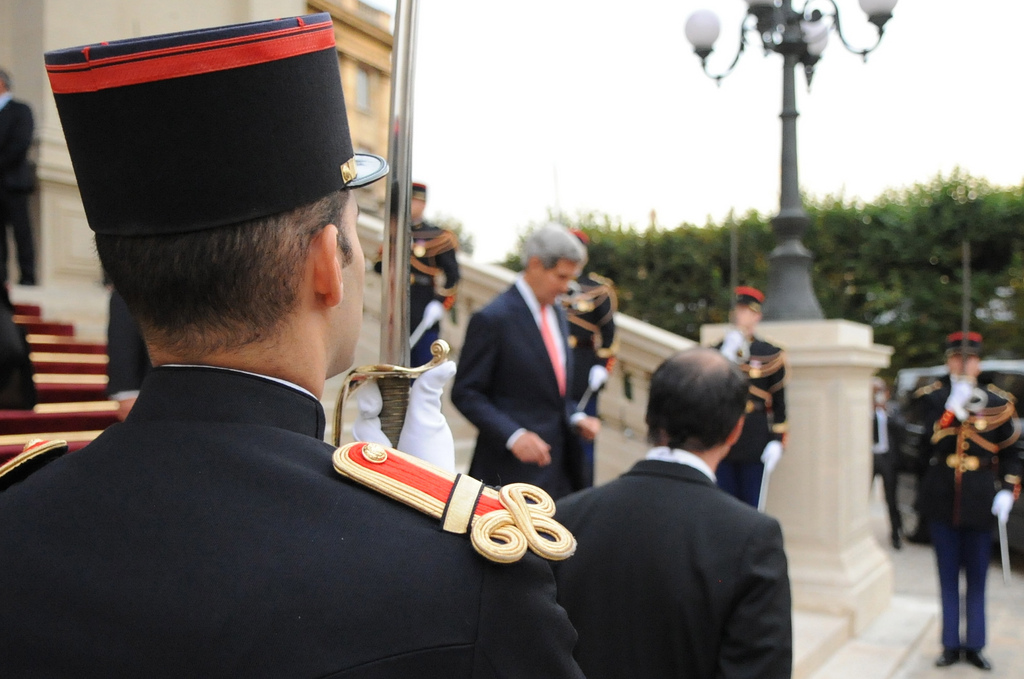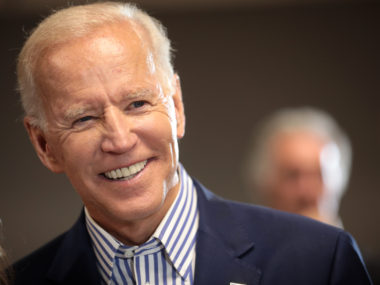By Andrew Kydd

The tale of US involvement in the Middle Eastern civil wars has now officially entered the realm of black comedy. Let’s recap. In the prequel, the US secured UN and NATO approval to intervene in Libya for humanitarian reasons, namely to support the emerging principle of the Responsibility to Protect, or R2P. The Qaddaffi regime had killed relatively few civilians, but observers anticipated that it would kill many more if it took the rebel-held town of Benghazi. Having secured a limited UN mandate to intervene, we then operated as the rebel air force until Qaddaffi was overthrown — all this despite the fact that Qaddaffi had previously surrendered all his chemical, biological and nuclear weapons programs to the US and Britain, Qaddaffi posed no threat to the US or any of our allies, and that we had a limited mandate, not a mandate for regime change. This distinction might have been familiar to someone aware of the recent history of US-Iraqi relations, and the contrast between George H.W. Bush’s conduct of the First Gulf War, in which he stuck to the mandate and kept the coalition together, and George W. Bush’s Second Gulf War, which operated on the “we don’t need no stinking mandate” principle.
Meanwhile, in Syria, as the anti-regime protests were brutally suppressed and civil war broke out in 2011, the United States stood on the sidelines. The US arguably had a national interest in overthrowing Assad because of his role as a link between Iran and Hezbollah and his reluctance to make peace with our ally Israel. And he was certainly killing civilians; as the body count passed each increment of 10,000, observers wondered when the US would take notice and do something.
Then, a year ago, President Obama almost accidentally drew a red line not at a specific number of people killed, but instead resting on the manner in which they are killed. According to Obama’s red line, the use of chemical weapons would bring unspecified but dire consequences. Obama seems to have thought that Assad was not planning to use chemical weapons, or could easily be deterred by a statement. In any event, the US then failed to enforce the red line through a series of incremental challenges in which the Syrian army first moved and then used chemical weapons on a small scale. Obama seems to have been extremely reluctant to enforce his own threat.
Finally, last month a serious chemical weapons attack killed over six hundred people. The US now faced the choice of enforcing a red line it clearly did not want to or letting it be exposed as a bluff, leaving the Syrian regime free to use more of its sarin arsenal against civilians believed to support the rebels. Russia and China, strangely unaffected by amnesia, refused to go along with the limited mandate, believing that mandates are simply green lights to the US to do whatever it feels like. Of course, the irony is that in this case that would be fine, because what the US feels like doing is nothing. Then, screwing up his resolve to the sticking point, President Obama . . . decided to ask Congress for permission. This has led some to speculate that Obama had decided not to attack and saw consulting Congress as a way of deflecting the blame for inaction.* So the President has failed to secure international support for a limited strike because everyone thinks he wants to overthrow Assad, when what he wants to do is nothing, and is having a hard time convincing Congress to approve a limited strike because what most members of Congress want to do is nothing. All this over an airstrike that Bill Clinton would have ordered without asking Newt Gingrich the time of day.
Enter Secretary of State John Kerry. The genius of the man, the sheer genius! In yet another offhand remark Kerry suggested that Assad could avert a US airstrike by handing over his chemical weapons stockpiles “in a week,” then quickly stated that of course Assad would never do it and it would be impossible anyway. Why make such a substantive proposal on the fly? It sounded good and would never be accepted. But remember what the Poet Burns said about the best laid schemes of mice and men, how they gang aft agley? Off the cuff remarks gang even agley-er. In the most recent of I’ve-lost-track-of-how-many snap judgments of the crisis, Russian Foreign minister Sergei Lavrov immediately embraced the Kerry initiative. Why? Believing that the US did not mean it seriously, which it didn’t, accepting the initiative quickly accomplished two important goals. First, it threw an additional monkey wrench in the administration’s quest for Congressional approval. Second, when the US eventually went back on its own proposal (which it would, right?) America would look hypocritical and hell-bent on war, and making the US look bad is always good from the Russian perspective. Oh and Syria has accepted it too, although their attitude might change if it looks like it might happen.
However, of course, the President is not hell-bent on war. In fact, his desire to do nothing is almost palpable. Nonetheless, and operating out of sheer malice, Syria and Russia are offering him a face-saving way to back out of the crisis gracefully by disingenuously accepting a disingenuous and unauthorized proposal from his own Secretary of State. Of course, Obama should accept immediately. Let’s not overthink this, guys. This would be pure comedy, except for the tens of thousands of civilians dying by mostly conventional weapons. That’s the black part.
*Some including Jim Fearon at APSA over Labor Day weekend. See his post here on the latest proposals.







14 comments
Are we certain that Lavrov and Assad are being disingenuous? There’s certainly a precedent (or two).
The only positive note about this entire fiasco is we have finally achieved a bipartisan consensus that the UN is useless and, if it does not agree with us, should be ignored when national interests are at stake.
It seems far better to say that it can’t accomplish much when great power interests collide.
The problem is, are they serious enough that we could actually trust them to hand over their stockpiles? Usually that kind of disarmament doesn’t happen in the middle of a civil war.
I think the Russians might be perfectly serious. The inability of the US president to bomb whomever he wants might not be nearly so palpable to them. In making the proposal, they may well have forestalled such a bombing. From their point of view, it’s probably tiring to constantly make a firm stand on behalf of an ally, be ignored by the powers that matter, and then stand by while that ally gets clobbered with impunity. Here they have taken an action and made a difference without taking on any risk to themselves. It doesn’t resolve the overall crisis, but it deals with a significant part of it, leaves their client in place, and at least postpones the final reckoning. It’s good for Obama, and it’s good for Putin. Unfortunately, it’s good for Assad, too.
And the existence of the UN as an entity that could secure the chemical stockpiles makes it at least somewhat viable.
I think your description of U.S. involvement in the civil war in Syria vastly understates the extent, and so the character, of U.S. engagement in that conflict. Here’s my working list:
* Verbal encouragement of the popular uprising against the Assad regime in 2011
* Obama’s 2011 statement that Assad must go
* Humanitarian aid to Syrian refugees
* Overt non-lethal aid to Syrian rebels
* Covert lethal aid to Syrian rebels (see stories on CIA moving arms from Libya)
* Now overt lethal aid to Syrian rebels
* Repeated pushes for a UNSC Chapter VII resolution in response to mass atrocities
* Repeated efforts to facilitate the political organization of the Syrian opposition
* Ongoing diplomatic efforts to convene an international conference to negotiate a political solution to the war
* Repeated statements that the U.S. was exploring various military options (e.g., no-fly zones)
* Probably lots of other covert stuff we can’t see
When you look at it this way, it’s much clearer that the U.S. isn’t dabbling occasionally in this war from a distance. Our government is deeply entangled in it already in many different ways, as are Iran, Russia, Saudi Arabia, Turkey, and many other governments, all of them alongside a number of transnational jihadi groups and NGOs. That context matters for thinking about the possibility of a deal on chemical weapons and the impact that process might have on the wider war that should, in my view, be the real concern here.
I was with you until the last part. Kerry’s remark was not by any means off-the-cuff. Putin and Obama discussed the plan at the G20 summit and everything after that was calculated to make it appear like an offhand comment that got picked up by the world. Kerry said what he said (and in the way he said it) quite deliberately, in order for Lavrov to pick up on it. The result is a potential win-win for both Putin and Obama. Putin gets the U.S. to avoid possible unilateral action that might weaken his client. Obama gets to do nothing (and potentially avoid a losing vote in Congress).